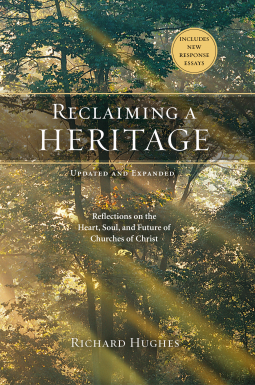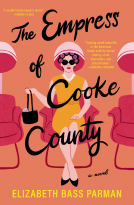
Reclaiming a Heritage, Updated and Expanded Edition
Reflections on the Heart, Soul, and Future of Churches of Christ
by Richard Hughes
This title was previously available on NetGalley and is now archived.
Send NetGalley books directly to your Kindle or Kindle app
1
To read on a Kindle or Kindle app, please add kindle@netgalley.com as an approved email address to receive files in your Amazon account. Click here for step-by-step instructions.
2
Also find your Kindle email address within your Amazon account, and enter it here.
Pub Date May 14 2019 | Archive Date Dec 16 2019
Abilene Christian University Press | ACU Press
Talking about this book? Use #ReclaimingAheritageUpdatedAndExpandedEdition #NetGalley. More hashtag tips!
Description
Can Churches of Christ Be Saved? At the turn of the millennium, Reclaiming a Heritage, a small book with a powerful message, examined the future and chaging identity of Churches of Christ, exploring the rich biblical resources that once anchored this tradition and could anchor it still. However, many in Churches of Christ have beome increasingly comfortable wearing cultural blinders, resulting in a distortion of the movement's original vision. This new edition of Reclaiming a Heritage invites Christians to consider a radical answer from the past—that true of disciples of Jesus must vigorously stand against cultural compromises in favor of God's Word.
Advance Praise
“To be called ‘disciples’ has always been a significant dimension of the Stone-Campbell Movement, but Richard Hughes situates this important theme in the context of the kingdom theology of Stone, Lipscomb, and Harding. This book reclaims the historic DNA of Churches of Christ, advocates for it, and calls us into it. Hughes reimagines our tradition so that the kingdom might flourish among us.”
—John Mark Hicks, Professor of Theology, Lipscomb University, and coauthor of Kingdom Come
“In these essays, Richard Hughes issues a heartfelt call to reclaim a vision of the kingdom of God, a vision that admits the human limitations of ignorance, history, and sin, and rejects any attempt to manage or tame the Almighty. If Churches of Christ are to survive, they need to hear this radical plea for a countercultural ethical vision.”
—Gary Holloway, Executive Director of World Convention and author of Unfinished Reconciliation
“In this volume, Hughes powerfully demonstrates how an understanding of our history can help us be ‘more biblical, more faithful to the cross, and more devoted to the cause of God.’ Not content merely to tell what happened, Hughes pushes readers to see the implications of our history for both individuals and churches. Focusing on competing ways we have interpreted Scripture, he proposes a radical remedy to our cultural accommodation, lack of voice for social justice, and abandonment of the original vision for restoration. His love for Churches of Christ is clear as he calls us to reclaim the strengths of our heritage in order to be all God would have us be.”
—Douglas A. Foster, University Scholar in Residence, Abilene Christian University
“For many years now, Richard Hughes—an insightful historian as well as a devoted church leader—has helped to shape my understanding of this heritage into which I was born. This book, a logical follow-up to Reviving the Ancient Faith, is no exception. Hughes cuts to the chase, asking the critical questions: What were the strengths of the restoration vision? Is the vision still valid? Is Scripture to be read as a blueprint or as a narrative? How can we resist the siren voices of our culture, choosing instead radical, cross-shaped lives? This insightful book needs to be read."
—Mike Cope, Director of Ministry Outreach, Pepperdine University
Available Editions
| EDITION | Paperback |
| ISBN | 9781684263905 |
| PRICE | $16.99 (USD) |
Links
Featured Reviews
 Reviewer 559304
Reviewer 559304
As a member of the body of believers that calls itself Churches of Christ, Richard's Hughes book Reclaiming a Heritage, is essential reading. It explains in detailed examples, the thoughts and beliefs of the founders such as Alexander Campbell and Barton Stone and their vision of an inclusive body of believers and how the church began to isolate itself from the greater Christian world.
As our body struggles to maintain membership and relevancy in the postmodern age, this book is crucial.
A collection of the author's essays and responses to those essays rooted in the author's previous magnum opus on the history of churches of Christ.
The author frequently reasserts his primary thesis throughout: churches of Christ were formed from the dual emphases of Alexander Campbell's Baconian Common Sense Realism and Barton Stone's apocalyptic theology. Campbell would eventually go Protestant Evangelical, and his model of Biblical exegesis, emphasis on sectarianism, and focus on ecclesiology would dominate in the movement. Stone's apocalypticism would be nurtured by Fanning and Lipscomb but would be devastated in the 20th century. He compares and contrasts the restorationist spirit in churches of Christ with those in Lutheranism, the Reformed, and Anabaptist movements.
As follow-up the author considers churches of Christ at the same type of juncture as before, but now with far fewer members and much more diminished. The author considers this as evidence of the claim. The author's general assessment of the historical situation is accurate: so many in churches of Christ are a bit ashamed of their heritage, and many presume they have no real heritage, and so far too many are heeding the siren song of evangelicalism at the very time when evangelicalism finds itself in cultural and social decline. I also appreciated the author's nuanced understanding of the previous heritage of the churches of Christ relative to Evangelicalism: perhaps looking similar in practice, but not nearly as Constantinian, with the apocalyptic maintaining some level of "healthy" skepticism about the world and even the American project.
In a sad irony, however, the author in his own ways seeks to advance a movement toward Evangelicalism in terms of the roles of women in the assemblies, attempting to make an association between matters of interpretation about women as what happened with slavery. It's lamentable that what the text says is being so flippantly cast off in the name of ancient culture. Noll's thesis is a bit more sound - abolitionists captured the spirit of God's purposes while slaveholders captured the letter of the text more accurately. The conclusion of such issues is never that hey, let's be careful about honoring both what the text says *and* the spirit of what God is seeking to accomplish in Jesus, and try to make it all work. No; one must be upheld against the other.
The author speaks of the "mainstream" churches of Christ, and admits as such, but casts off the "splinter groups" a bit too easily (hi, an "anti" here; we still exist; actually in decent numbers!).
A good follow-up to a good historical analysis, although I would very much like to see someone somewhere do a study of how much of the apocalyptic was cast aside on account of a desire for middle class American respectability, both among the Disciples of Christ and then later among Churches of Christ.
 Rocky W, Educator
Rocky W, Educator
While not a member of the churches of Christ, I am a member of the middle stream of the same restoration movement in an independent Christian Church. Studying the history of the movement and looking towards the future is both intriguing and frightening. It seems like both the churches of Christ and the Independent Christian Churches have a little time to correct for decades of misguided associations, improper views of the current situation of our movment(s) and nation.
Hughes, while painting a pretty bleak picture at many points continues to hold out hope that the churches of Christ can reset the course and head in a revivalist direction that will both help the brotherhood of churches and expand the Kingdom of God. In the end he points to the fact that whether the movement rites itself or not, the Kingdom of God will prevail in God's time. Let's hope that the movement can rite itself and we can be a powerful force in shining the Gospel into a darkening world and thus bring many to the foot of the cross and the Kingdom of the Savior!
While I was challenged by Hughes chapters, I found the responses to be mainly restatements of his main points. The few additions were welcomed, but I felt much more could have been added with the responses if the authors would have either spoken against Hughes arguments or more fully expanded upon them.
Over all this is a highly insightful book for those within the restoration movement, I suppose, especially within the churches of Christ.















